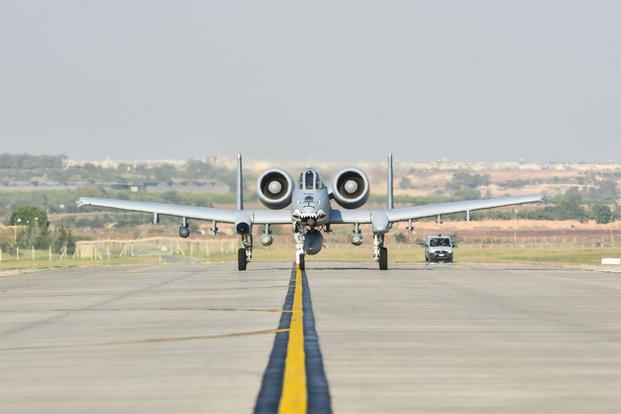Turkish Prime Minister Binali Yildirim rattled NATO allies with recent remarks suggesting that Russian warplanes could share Incirlik Air Base with the U.S. before adding that it wasn't likely to happen.
Moscow hasn't asked to use Incirlik, and "Russia doesn't need to use the base. They have bases in Syria," Yildirim told foreign reporters in Istanbul on Saturday, according to Turkish news outlets. "Russia had no demands to use Incirlik Air Base. Those reports are not true."
However, Yildirim said that other nations use Incirlik in southeastern Turkey and a Russian request to base planes there would be considered if it were made.
The flap over Incirlik came ahead of a fence-mending visit to Ankara on Wednesday by Vice President Joe Biden to ease rampant suspicions in Turkey that the U.S. may have been involved in the July 15 failed military coup.
On Monday, Army Gen. Curtis Scaparrotti, NATO's supreme commander and head of U.S. European Command, visited Incirlik and met with Gen. Hulusi Akar, chief of Turkey's General Staff. Akar was taken hostage during the coup attempt and reportedly had a gun held to his head before he was rescued.
In a statement, Scaparrotti said, "Turkey is fundamental to security on our southern flank" of NATO. He thanked the Turks for their contributions to the alliance and "for access they have granted us to their bases, which are critical for our operations."
Earlier this month, Joint Chiefs Chairman Marine Gen. Joseph Dunford also visited Turkey to show support for the government and to make contacts with the new Turkish military leadership. Following the coup attempt, Turkish President Recep Tayyip Erdogan sacked more than 100 generals and admirals.
Turkish suspicions of U.S. involvement in the coup were fueled by the presence in the U.S. of 75-year-old Fethullah Gulen, an Islamic cleric living in exile in Pennsylvania.
Erdogan has blamed Gulen for fomenting the coup attempt and demanded his immediate extradition. Secretary of State John Kerry has said Turkey's demand for extradition must go through the lengthy and laborious process required by the U.S. Justice Department.
Incirlik has been vital to the U.S. air campaign against ISIS in Syria and in providing protection to about 300 Special Operations troops on the ground in Syria in advise and assist roles to U.S.-backed opposition forces.
Last Thursday, F-15 fighters scrambled from Incirlik when Syrian air force Su-24s bombed near U.S. troops on the outskirts of the northeastern city of Hasakah. The Syrian aircraft left the area before the U.S. jets arrived.
Since the coup attempt, Erdogan has made clear that he is seeking closer ties with Russia. His first foreign trip since the coup was to St. Petersburg, where he met with Russian President Vladimir Putin and apologized for the incident last November in which a Turkish F-16 fighter shot down a Russian warplane near the Turkish border.
Russian news outlets have seized on the remarks by Yildirim suggesting that an arrangement might be possible in which Russia would get the use of Incirlik.
The Russian publication Izvestia Daily quoted Putin ally and upper house member Igor Morozov as saying that "it just remains to come to an agreement with Erdogan that we get the NATO base at Incirlik as [our] primary airbase."
The mixed messages on the use of Incirlik came as Iran revoked its permission for Russia to use the Hamadan air base southwest of Tehran on bombing missions over Syria.
Russian warplanes used Hamadan three times last week for bombing runs over Syria, but Moscow apparently riled the Iranians by going public on the missions.
Iran's minister of defense, Brig. Gen. Hossein Dehghan, called Moscow's disclosure of the Hamadan arrangement a "betrayal of trust" and "ungentlemanly," The New York Times reported.
Iran's Foreign Ministry spokesman, Bahram Ghasemi, told reporters in Tehran that the permission had been temporary and "it is finished, for now."
-- Richard Sisk can be reached at Richard.Sisk@Military.com.
Related Video:
Two Minute Brief: US - Russia Relations





























